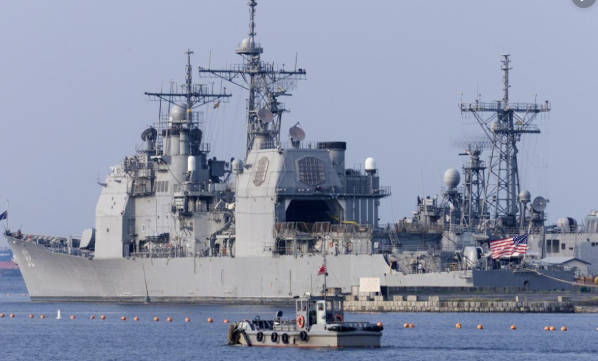Andrew Osborn, Tim Kelly
MOSCOW/TOKYO (Reuters) – Russia and the United States blamed each other for a near collision between their warships in East Asian waters on Friday with both countries accusing one another of dangerous and unprofessional behavior.
Acting U.S. Defense Secretary Patrick Shanahan said Washington would lodge a formal diplomatic protest to Russia, while a senior Russian parliamentarian said such episodes could easily escalate tensions, which he said were already balanced “on a razor’s edge”.
Russia’s Pacific Fleet said that the USS Chancellorsville, a guided-missile cruiser, had come within just 50 meters (165 feet) of the Russian destroyer Admiral Vinogradov which was forced to take emergency action to avoid a collision, Russian news agencies reported.
They cited a Russian Pacific Fleet statement as saying the incident took place in the early hours of Friday morning in the eastern part of the East China Sea at a time when a group of Russian warships was on a parallel course with a U.S. naval strike group.
“The U.S guided-missile cruiser Chancellorsville suddenly changed course and cut across the path of the destroyer Admiral Vinogradov coming within 50 meters of the ship,” the statement said.
“A protest over the international radio frequency was made to the commanders of the American ship who were warned about the unacceptable nature of such actions,” it said.
The U.S. Navy rejected that version of events, saying the behavior of the Russian ship had been “unsafe and unprofessional”.
“While operating in the Philippine Sea, a Russian Destroyer … made an unsafe maneuver against USS Chancellorsville,” U.S. Seventh Fleet spokesman Commander Clayton Doss said.
“This unsafe action forced Chancellorsville to execute all engines back full and to maneuver to avoid collision.”
He described a Russian assertion that the U.S. ship had acted dangerously as “propaganda”. The Russian destroyer came within 50 to 100 feet of the Chancellorsville, he said, putting the safety of its crew and the ship at risk.
Acting U.S. Defense Secretary Shanahan said Washington would formally protest.
“We’ll have military-to-military conversations with the Russians, and of course we’ll demarche them, but to me safety at the end of the day is the most important (part),” he told reporters outside the Pentagon.
“It will not deter us from conducting our operations.”Slideshow (6 Images)
The incident comes days after Washington and Moscow sparred over an allegedly unsafe spy plane intercept by a Russian fighter jet near Syria.
Alexei Pushkov, a senior Russian parliamentarian, said the near naval miss and other incidents like it were dangerous.
“We’re balancing on a razor’s edge,” he wrote on social media.
Additional reporting by Maria Kiselyova in Moscow and by Phil Stewart in Washington; Writing by Andrew Osborn; Editing by Frances Kerry
